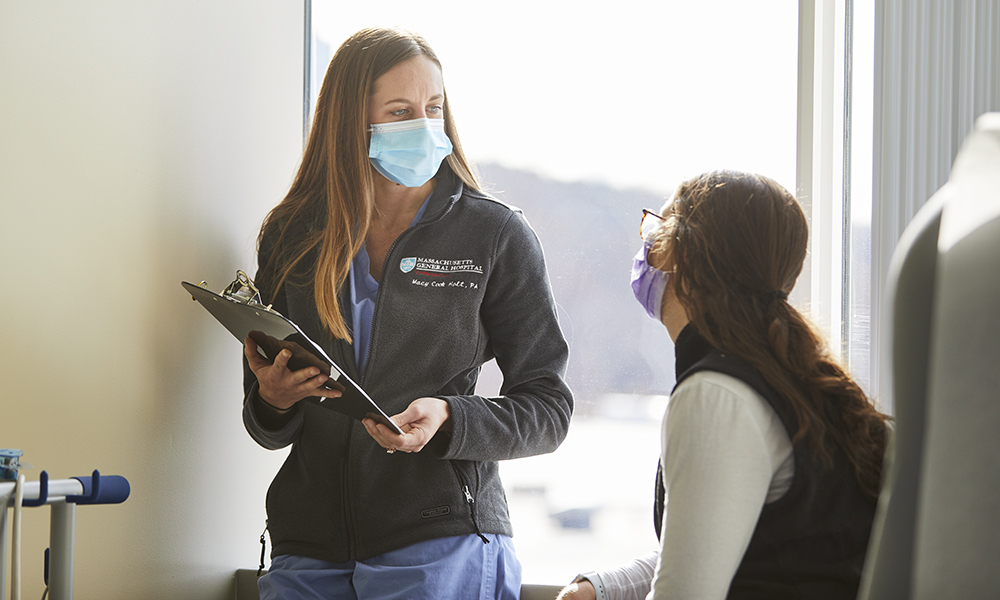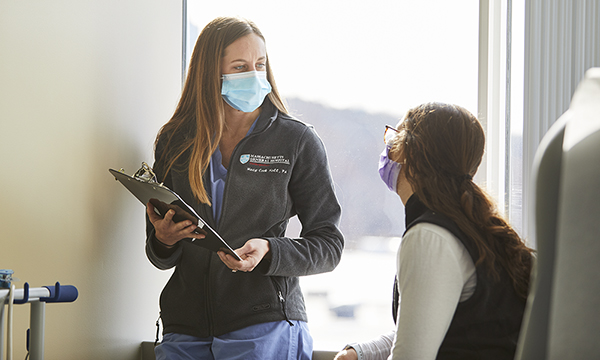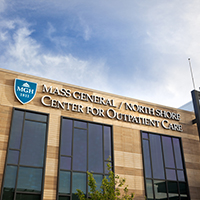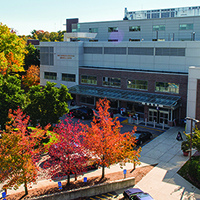Department of Orthopaedic Surgery
Surgical Optimization


Our Advanced Practice Providers (APPs)
Advanced Practitioners (also known as Advanced Practice Providers - APPs) include Nurse Practitioners (NPs) and Physician Assistants (PAs). These highly skilled, licensed professionals are an integral part of our department.
Meet our APPsExplore the Surgical Optimization Program (SOP)
You and your provider have decided that a surgical procedure is the best path forward for your orthopedic condition. Making the decision to schedule surgery is a strong first step towards a better quality of life. Whether you are dealing with an acute or chronic injury, a debilitating illness or are taking preventative measures to ensure future wellness, our multidisciplinary team is here for you.
The goal of this optimization program is to provide safe, efficient quality of care. All surgeries involve risk, and our goal is to identify and minimize risks by optimizing your health prior to surgery.
What is the Surgical Optimization Program?
Identifying Risk Factors
Before your surgery, a member of your team will have a discussion with you to identify your risk factors that may interfere with your surgical journey and healing process. You and your surgeon will come to a shared understanding of steps you will both take to make sure you are ready for surgery, which could include plans for smoking cessation, diet modification, medication adjustment or other strategies. For our geriatric patients, please see the Perioperative Optimization of Senior Health (POSH) Clinic.
Some risk factors you will be screened for include:
- Smoking
- Diabetes
- Anemia
- Nutrition (e.g. eating disorders, obesity)
- Disorders of the blood, heart, kidneys, liver, lungs or thyroid
- Implantable devices (e.g. pacemaker, defibrillator, stents, insulin pump)
- Social determinants (e.g. housing, insurance & support network)
- Substance abuse
- Chronic pain medication
- Steroid medication
- Malignant hyperthermia
- Mental health conditions (e.g. PTSD, bipolar, schizophrenia, OCD)
- Bone density issues (e.g. osteoporosis)
- Cancer & treatment side effects
- Medication allergies
- Viral or bacterial infections (e.g. MRSA/MSSA)
- Medications that may interfere with anesthesia or increase risk for bleeding
Your Surgical Journey
Below is a flowchart that illustrates the journey you will take:
You and your surgeon agree to proceed with surgery
Surgical Optimization Counseling & Coordination of Care: All patients scheduled for surgery will require the following:
- An optimization visit with their surgical team or preoperative/optimization visit with their PCP to review all medical conditions (co-morbidities) and discuss any conditions that might prevent surgery from happening.
- Pre-Procedure Evaluation (PPE) phone call with anesthesia MD/RN
- You will speak with a nurse on the phone to review your medications and discuss fasting and other anesthesia preparations.
- Showering with antimicrobial soap/Hibiclens
- Signed Informed Consent
- Completion of your Healthcare proxy form
Your medical history + procedural complexity = surgical risks that must be addressed before your procedure
In addition to the general presurgical requirements listed above, you may require other testing based on your current health status and the type of surgery you are having such as:
- MRSA/MSSA screening
- For patients undergoing total joint and certain spine procedures MRSA/MSSA screening is required
- Patient instructions on preventing infection after surgery (English/Spanish)
- CDC MRSA information for patients
- Specialists Clearance
- If you are currently under the care of a specialist provider you may require clearance from your specialist prior to surgery (e.g. cardiologist, pulmonologist, endocrinologist, oncologist, rheumatologist)
- Other
- You may need additional pre-surgical screening and testing, such as blood tests or an EKG
Patient Education/Readiness for Discharge: Your surgical team will identify whether you are a candidate to be discharged the same day of surgery or if you will require a longer hospitalization period. In a pre-op appointment, your team will provide the specific steps of your recovery plan, including need for inpatient rehab, outpatient physical and occupational therapy, weight-bearing restrictions, limitations on motion, etc.
Procedure confirmation call/email: You will receive a call or email prior to surgery from your surgeon’s office as a final confirmation of the date and time of your procedure
Your Surgery
Your recovery: You may go home the same day, stay in the hospital overnight or remain hospitalized for a longer period of time
Outpatient facility and
same-day recovery & discharge
Inpatient recovery & discharge
Follow-up with your surgeon's office
Before Surgery
Avoid Financial Surprises
- To avoid billing errors, make sure your insurance information is up-to-date in your medical record via Patient Gateway, and/or Patient Registration (866-211-6588)
- Ensure your insurance is accepted by Mass General prior to surgery
- Ensure Workers Compensation claims are done with your surgeon’s office
Informed Consent
An informed consent is a discussion that takes place between patient and provider, which explains the surgery or treatment in detail, including all the risks and benefits of the proposed procedure, so that a shared decision making process takes place.
Informed consent is a process to obtain permission from a patient before any healthcare intervention takes place. This includes any diagnostic procedures, chemotherapy, radiation treatment, surgery, research studies, and clinical trials. Patients 18 years and older sign this informed consent. Patients under 18 years of age have their parents sign, and for those patients deemed incompetent (mentally challenged), a guardian signs the form. It is a legal document that must be signed before any surgery.
Healthcare Proxy
Prior to surgery, a Health Care Proxy must be completed. This is a simple legal document that allows you to name someone you know and trust to make health care decisions for you if, for any reason and at any time, you become unable to make or communicate those decisions.
Read more about a Health Care Proxy
It is an important document because it concerns not only the choices you make about your health care, but also the relationships you have with your physician, family, and others who may be involved with your care.
Refer to the Massachusetts Health Care Proxy form.
If you have any of the following and want it to be part of your medical record, bring a copy with you to our office:
- Living will
- Do not resuscitate (DNR)
- Medical Order for Life Sustaining Treatment (MOLST)
- Physician Order for Life Sustaining Treatment (POLST)
A heath care proxy and/or an advanced directive/living will is used to describe a patient’s preference about life sustaining treatment that are to be honored after the patient loses decision making capacity.
Patient Gateway & Pharmacy
- Ensure you are connected to Patient Gateway, Mass General Brigham's patient portal, which provides the most efficient access to your surgical team.
- Before surgery, most patients need to complete a health history form, pre-procedure questionnaire and additional questionaires regarding your surgical outcomes. If you need help setting up a Patient Gateway account, reach out to Patient Gateway support.
- Check in Patient Gateway to confirm the correct pharmacy is listed in your medical record. Notify your doctor’s office of any changes.
Preparing your Home Before Surgery
Prior to your surgery, there are several things you can do to make your home and bathroom safer and more comfortable when you return home. A few examples are listed below. Your doctor’s office may give you more specific information on preparation based on your unique case; however, here are some suggested tips. If you have questions about preparing your home before surgery, contact your doctor’s office.
Tips on Preparing your Home before Surgery
- Move furniture to make clear paths in your home. You may be using crutches or other assistive devices after your surgery, so you will need more room to move around.
- Depending on the type of surgery, consider setting up a sleeping area on the first floor.
- Move throw rugs that may cause a slip or trip.
- Stock-up on food, toiletries and medications.
- Prepare and freeze meals before your surgery.
- Ask a friend or relative to stay with you or come by for visits after surgery.
- Shower chairs and hand-held shower heads can make bathing easier and safer.
Taking Medications Prior to your Surgery
Due to the increase in medication production for various diseases, guidelines for taking or holding medications prior to surgery are constantly undergoing revisions by our anesthesiologists based on the latest research.
Most patients will receive a pre-procedure phone call (PPE) with the anesthesia team to review medications prior to surgery. However, those who take medications for diabetes, anticoagulation, rheumatoid arthritis or cancer should check with the physician who prescribes the medication to discuss contrainducations relative to surgery. For example, stop the anticoagulant Eliquis (Apixaban) three days before surgery due to the increased risk of bleeding. Your surgeon's office will also be involved in this discussion.
Please note: for GLP-1 and SGLT-2 medications, please see the description below for more specific guidelines.
General guidance on medication
- To prevent your surgery from being canceled, patients must be certain all of their medications are properly listed in the hospital computer system (EPIC) and they must review these medications with their surgical team.
- Continue your routine daily medications unless instructed to stop
- Continue taking your daily ASPIRIN before surgery, including the day of surgery, unless instructed to do otherwise
- STOP taking aspirin-containing products seven days before surgery. For example, Alka-Seltzer, Bayer Arthritis, Fiorinal, Midol, Pepto-Bismol and Percodan
- STOP Vitamin E, fish oil, and herbal supplements seven days before surgery. For example, Chondroitin, Echinacea, Feverfew, Garlic, Ginkgo Biloba, Ginseng, Kava, Ma Huang, saw Palmetto, Valerian, St. John’s Wort
- For GLP-1 medications (i.e. Ozempic, Mounjaro, Wegovy): hold medication for one week prior to surgery with a clear liquid diet the day before surgery.
- For SGLT-2 medicaitons (i.e. Jardiance, Steglatro): hold times vary. For Jardiance, hold medication for three days and for Steglatro, hold medication for four days.
- STOP Coumadin (warfarin) usually 4-5 days before surgery
- You may need to start Lovenox injections, take as directed
- STOP other anticoagulants (i.e. Plavix, Eliquis, Aggrenox, Xarelto) as directed by the prescribing doctor/surgical team.
- For chemothearpy and immunotherapy medications, speak with your oncologist and surgical team.
- STOP taking anti-inflammatory drugs (NSAIDs) three days before surgery. For example, Motrin, Ibuprofen, Naprosyn, Naproxen, Advil, Aleve, Lodine, Daypro, Vicoprofen, Anaprox, Ansaid, Arthrotec, Celebrex, Cataflam, Diclofenac, Feldene, Indocin, Ketoprofen, Mobic, Toradol, Relafen, Voltaren
- Take TYLENOL or continue with your current narcotic regimen, if it includes medications such as Ultram (tramadol), percocet/oxycodone, oxycontin, vicodin (hydrocodone), dilaudid, methadone or Fentanyl patch
Diet Before Surgery
Always follow the instructions that your doctor gives you regarding when to stop eating and drinking before surgery. Otherwise, your surgery may be delayed or rescheduled.
General guidance on eating and drinking prior to surgery
The evening before your surgery
At 10pm:
- STOP eating all solid foods and dairy products
- STOP chewing gum and/or eating candy
After 10pm:
- While you are awake, you may drink one or two tall glasses of water, apple juice, black coffee or black tea every one to two hours.
Stop drinking anything two hours BEFORE arriving at your surgical location. For example, if you are told to arrive at your surgical location at 7:45am, stop drinking at 5:45am.
If you are diabetic and feel symptoms of low blood sugar or your finger stick reading is low, please drink apple juice.
Approved list of clear liquids:
- Water
- Apple juice
- Black coffee
- Black tea
ABSOLUTELY NO ORANGE JUICE, NO CREAM, NO CREAMER, NO MILK AND NO HONEY! NO SUBSTITUTIONS!
Please follow your instructions about eating and drinking. Otherwise, your surgery may be delayed or rescheduled.
Day of Surgery
Getting Dressed the Day of Surgery
- Wear loose, comfortable clothing the day of your surgery.
- Do not wear any nail polish, hair spray, body lotion, perfume, or make up.
- Do not wear jewelry, including rings, wedding bands and piercings. The operating room staff may need to cut off rings if they are not removed.
- Do not wear contact lenses on the day of your surgery. Bring your glasses and a case for storing them.
What to Bring on the Day of Surgery
- Insurance and prescription cards
- List of current medications and allergies
- Any specific medications recommended by your surgeon’s office
- Inhaler (if you currently use one)
- Book or magazines to read before going into surgery
- Eyeglasses and case - do not wear contact lenses to your procedure
- Flat, comfortable athletic or walking shoes (slip-ons are ideal)
- Elastic waist-band pants and pajamas (if staying overnight)
- Any specific personal toiletries you want from home (if staying overnight)
- Please do not bring any valuables or large amounts of cash.
After Surgery
Recovery Planning

The road to recovery begins before your surgery. By planning ahead, you can help prepare yourself for a low-stress recovery. Pre-operative and post-operative preparedness are the best way to ensure good outcomes and ease anxiety after surgery, so it is crucial that you play an active role in this aspect of your surgical journey. Each person’s recovery is unique, but the list below can give you a general idea on what to expect and what you can do to prepare.
Discharge
Once your surgery is scheduled, you should make arrangements for:
- Transportation home from the hospital, a family member or friend who can help get you home safely
- A safe home environment conducive to healing
- Post-op equipment to enhance your recovery at home as deemed by your surgical team
Your care team will have a conversation with you about your post-surgical discharge and beyond, a period they may refer to as "post-acute level of care."
Where you will be sent or discharged following your surgery is based on:
- Assessment of a patient’s individual clinical needs
- Plans for ongoing treatment pre- and post-discharge
- Patient/family/responsible person choices and input
- Interdisciplinary team input
- Available post-hospital care options
- Available insurance/financial resources
After surgery, there are three general ways patients are discharged:
- "Day 0" discharge means you go home the same day as your surgery.
- "Discharge to home with inpatient stay" means you will stay overnight in the hospital before being discharged to your home.
- "Discharge to rehab" means you will stay overnight in the hospital before being discharged to to a rehab facility.

Learn more about the different levels of care facilities.
You and your care team will determine what’s best for your needs in order to maximize your level of function and independence.
Anticoagulation
Anticoagulation is a category of medication that is given in the post-operative period to prevent blood clots, either in the leg or lungs. This class of medication can be administered orally or with an injection.
Incision Care
Incisions are often closed by removable sutures or staples or with dissolvable sutures/glue. Incisions are covered with a dry dressing. It is important to discuss incision care with your surgical care team prior to surgery and at the time of discharge. You can optimize your incisional healing by not smoking and eating healthy.
Wound Vacuum-Assisted Closure
This type of dressing helps facilitate wound healing. There are two types of wound VACs you could leave the hospital with:
- Traditional wound VAC applied to an open wound
- Incisional wound VAC that is applied over your closed incision
Since wound VAC therapy is specific to each patient’s needs, it is important you refer directly to your surgeon’s written instructions after leaving the hospital, or call their office with questions.
Red Flags
As your incision heals, it is important to report any concerning symptoms to your surgeon’s office. After surgery, these are signs/symptoms to look for that would warrant an urgent office visit.
When to call:
- Incision issues - as your incision heals, it is important to report any of the following:
- New/worsening redness (especially accompanied by fever, chills)
- Drainage/bleeding from incision
- Worsening swelling/edema
- Wound dehiscence (incision separates or ruptures)
- If your wound VAC dressing malfunctions or stops working
- Worsening numbness/tingling/loss of sensation
- Significant discoloration of operative limb
- Significant change in bowel or bladder function
- Significant change in range of motion of operative extremity
- Significant change in ability to bear weight
- Shortness of breath
- Chest pain
- Brace/cast issues (wet cast, too tight, etc)
Pain Management
When you are home after surgery, ice therapy is an effective form of pain management to relieve swelling and pain. Notify your surgeon or APP if you are currently being treated with prescription pain medication for chronic discomfort.
More about Narcotics
We ask most patients to stop taking their pain medications two to three weeks after surgery. If you require narcotic pain medication beyond three weeks, you may be referred to a pain clinic or to your primary care provider for further pain management. We do not provide narcotic pain medications for acute, non-surgical issues.
Note: Some narcotic pain medications cannot be called into the pharmacy. Plan ahead if your prescription is running low, as you will need to have the prescription mailed to you, or you need to pick up a new prescription at our office.
Activity Limitations
Many orthopedic patients have activity restrictions after surgery. Prior to surgery, your surgeon will review with you what you can expect to experience following surgery in terms of activity modifications, including the amount of weight you can put on your operated body part and any range-of-motion limitations.
Driving after Surgery
Patients should discuss their driving habits/needs with their surgeon, who will consider several factors and advise when it is safe to resume normal driving.
Recovery at Home
Once you are home, follow all of your care team’s advice, take all medications as prescribed, get plenty of rest and hydration and call your surgeon’s office with any questions you may have.
Follow-up
- Most patients require a post-operative visit between 2-6 weeks after surgery. The time-frame for your first post-op visit depends on your specific procedure. Your surgeon's office will tell you the appropriate time-frame for your procedure.
- It is best to ensure your post-op appointment is scheduled prior to your surgery. This allows time for you and your family/friends to plan for transportation to the clinic.
- During this visit your surgical care team will remove sutures/staples if necessary, evaluate how your incision is healing, obtain x-rays if necessary and discuss progression of activity/range of motion. All of your concerns will be addressed.
Surgical Locations
Our orthopaedic surgeons perform surgery at five locations:

Mass General - Boston Campus
55 Fruit Street
Boston, MA 02114

Mass General Brigham Healthcare Center (Danvers)
102-104 Endicott Street
Danvers, MA 01923

Mass General Brigham Healthcare Center (20 Patriot Place, Foxborough)
20 Patriot Place
Foxborough, MA 02035

Newton-Wellesley Hospital
2014 Washington Street
Newton, MA 02462

Mass General Brigham Healthcare Center (Waltham)
52 Second Avenue
Suite 200 (green building) & Suite 4000 (blue building)
Waltham, MA 02451
Department of Orthopaedic Surgery
We are a world leader in treating the full spectrum of musculoskeletal conditions.
Orthopaedic Surgery Surgical Optimization Program
Mass General’s Department of Orthopaedic Surgery is committed to making your surgical experience a smooth one. We are here to help you navigate your surgical journey, and get you back to doing what you love most.
